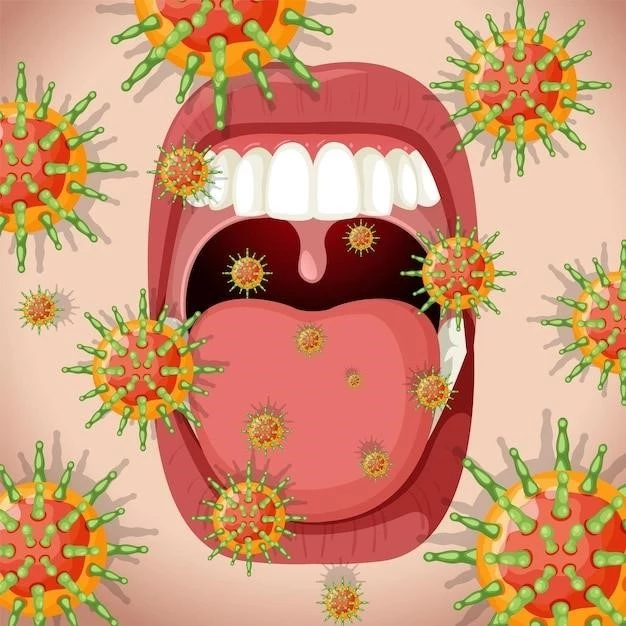Understanding Aphthous Stomatitis
Causes of Aphthous Stomatitis
Symptoms and Diagnosis of Aphthous Stomatitis
Treatment Options for Aphthous Stomatitis
Prevention of Recurrent Aphthous Stomatitis
Link Between Diet and Aphthous Stomatitis
Psychological Impact of Aphthous Stomatitis
Management of Pain in Aphthous Stomatitis
Role of Stress in Aphthous Stomatitis
Causes of Aphthous Stomatitis
Aphthous stomatitis may be caused by various factors including immune system abnormalities‚ viral infections‚ hormonal changes‚ genetic predisposition‚ and tissue injury. Some triggers include stress‚ certain foods‚ and a compromised immune system.
Immune system abnormalities can lead to the body attacking its own tissues‚ resulting in mouth ulcers. Viral infections like herpes simplex can also contribute to the development of aphthous stomatitis. Hormonal changes‚ such as those occurring during menstruation‚ can trigger episodes of mouth ulcers.
Genetic predisposition plays a role in susceptibility to aphthous stomatitis‚ with a family history of the condition increasing the likelihood of developing it. Additionally‚ tissue injury from accidental biting‚ dental work‚ or other trauma to the mouth can lead to the formation of ulcers.

Symptoms and Diagnosis of Aphthous Stomatitis
The symptoms of aphthous stomatitis often include painful‚ round or oval ulcers in the mouth‚ typically surrounded by reddened halos. These ulcers can appear on the inner cheeks‚ lips‚ gums‚ tongue‚ or throat. In severe cases‚ multiple ulcers may be present simultaneously.
Diagnosis of aphthous stomatitis is usually based on the clinical presentation of the mouth ulcers. Physical examination of the oral cavity by a healthcare provider is typically sufficient to diagnose the condition. In some cases‚ further tests or biopsies may be conducted to rule out other potential causes.
In addition to mouth ulcers‚ patients with aphthous stomatitis may experience general symptoms such as fever‚ fatigue‚ and swollen lymph nodes. It is essential to consult a healthcare professional if you experience recurrent or severe mouth ulcers for proper evaluation and management.
Treatment Options for Aphthous Stomatitis
Treatment of aphthous stomatitis aims to alleviate symptoms‚ promote healing‚ and prevent recurrence. Over-the-counter topical medications like corticosteroids‚ analgesics‚ or oral rinses containing antibacterial agents can help relieve pain and reduce inflammation.
In more severe cases‚ healthcare providers may prescribe systemic medications such as corticosteroids or immune-modulating drugs to manage symptoms. Maintaining good oral hygiene practices and avoiding triggers like spicy foods or acidic beverages can also aid in the healing process.
In addition to pharmacological treatments‚ alternative therapies like laser therapy or herbal remedies may be considered. It is essential to follow the recommendations of a healthcare provider when selecting a treatment plan for aphthous stomatitis to ensure safety and effectiveness.
Prevention of Recurrent Aphthous Stomatitis
Preventing recurrent aphthous stomatitis involves identifying and managing potential triggers. Maintaining good oral hygiene by brushing teeth gently with a soft-bristled brush‚ using alcohol-free mouthwash‚ and avoiding abrasive dental products can aid in preventing irritation to the mouth.
Avoiding foods that may trigger ulcers‚ such as spicy or acidic foods‚ can help reduce the likelihood of recurrent episodes. Managing stress through relaxation techniques like meditation‚ yoga‚ or deep breathing exercises may also play a role in preventing flare-ups of aphthous stomatitis.
Monitoring hormonal changes and addressing any underlying health conditions can further contribute to preventing recurrent mouth ulcers. Seeking regular dental check-ups and discussing strategies with a healthcare provider can help develop a personalized prevention plan tailored to individual needs.
Link Between Diet and Aphthous Stomatitis
The link between diet and aphthous stomatitis revolves around identifying and avoiding trigger foods that may exacerbate mouth ulcers. Certain individuals may find that spicy‚ acidic‚ or rough-textured foods trigger or worsen symptoms of aphthous stomatitis.
Limiting the consumption of these foods and opting for a well-balanced diet rich in vitamins‚ minerals‚ and antioxidants can help support oral health and potentially reduce the frequency of mouth ulcers. Maintaining proper hydration by drinking an adequate amount of water daily is also essential for overall oral health.
Individuals prone to recurrent aphthous stomatitis may benefit from keeping a food diary to track potential triggers and patterns; Consulting with a healthcare provider or a dietitian to develop a dietary plan tailored to individual needs can aid in managing and potentially preventing episodes of aphthous stomatitis.
Psychological Impact of Aphthous Stomatitis
Aphthous stomatitis can have a significant psychological impact on individuals‚ causing distress‚ anxiety‚ and decreased quality of life. The recurring nature of mouth ulcers can lead to feelings of frustration‚ embarrassment‚ and social withdrawal due to the discomfort and visibility of the lesions.
Living with chronic or recurrent aphthous stomatitis may also affect self-esteem and confidence‚ particularly if the condition interferes with daily activities such as eating‚ speaking‚ or smiling. Coping with the pain and uncertainty of when the next ulcer will appear can lead to emotional strain and psychological distress.
Seeking support from healthcare providers‚ counselors‚ or support groups can help individuals cope with the psychological impact of aphthous stomatitis. Developing coping strategies‚ practicing self-care‚ and maintaining open communication about the emotional challenges associated with the condition are essential for overall well-being and mental health.
Management of Pain in Aphthous Stomatitis
The management of pain in aphthous stomatitis focuses on alleviating discomfort and promoting healing of the mouth ulcers. Over-the-counter pain relievers such as acetaminophen or ibuprofen can help reduce pain and inflammation associated with mouth ulcers.
Topical oral analgesics or anesthetics like benzocaine can be applied to the ulcers to numb the area and provide temporary pain relief. Avoiding spicy‚ hot‚ or acidic foods that may irritate the mouth can also help manage pain during episodes of aphthous stomatitis.
Rinsing the mouth with salt water or over-the-counter mouthwashes specifically formulated for mouth ulcers can promote healing and alleviate discomfort. Maintaining good oral hygiene practices and following any prescribed treatments or recommendations from healthcare providers are crucial in effectively managing pain associated with aphthous stomatitis.
Role of Stress in Aphthous Stomatitis
Stress is recognized as a significant contributing factor to the development and exacerbation of aphthous stomatitis. Emotional or psychological stress can weaken the immune system’s response‚ making individuals more susceptible to mouth ulcers.
High levels of stress can trigger hormonal changes and inflammation in the body‚ potentially leading to the onset of aphthous stomatitis in predisposed individuals. Stressful events or chronic stress can also prolong the healing process of existing ulcers and increase the likelihood of recurrent episodes.
Managing stress through relaxation techniques‚ mindfulness practices‚ regular physical activity‚ and seeking emotional support can help reduce the impact of stress on aphthous stomatitis. Developing healthy coping mechanisms and addressing sources of stress are integral components of effectively managing and preventing mouth ulcers associated with stress.
